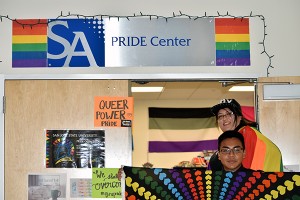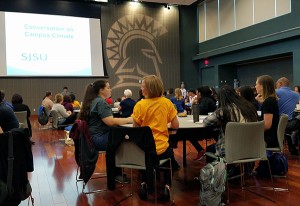San Jose State University will host a screening of the documentary “Stolen Education,” followed by a discussion, Feb. 28, at 6:30 p.m., in the Dr. Martin Luther King Jr. Library, Room 225/229. The documentary discussed segregation of schools in the southwest during the 1950s and looks at the way eight Mexican-American school children fought against injustice. The event will be attended by Dr. Enqique Aleman Jr, an executive producer and writer, and professor and chair of Educational Leadership and Policy Studies at the University of Texas, San Antonio, along with Ruby Luna, a director and writer. The discuss is sponsored by the Connie L. Lurie College of Education, MOSAIC Cross Cultural Center and Adelante, the Chicanx/Latinx Student Success Task Force. Associate Professor Rebeca Burciaga, from SJSU’s educational leadership department, helped to coordinate the event.
Category Archives: Diversity, Inclusion and Global Citizenship
Spangler’s ‘The Kite Runner’ Adaptation Opens in London with Positive Reviews
Matthew Spangler, a professor of communication studies in SJSU’s College of Social Sciences, created a theater adaptation of Khaled Hosseini’s Kite Runner that is currently on stage in London’s West End. The show opened on Dec. 21 and runs until March 11. The performances are at Wyndham’s Theatre, an 800 seat venue off Leicester Square. The play has so far garnered more than two dozen reviews, including the few publications highlighted below:
“The best page-to-stage show since War Horse. . . . Matthew Spangler’s adaptation held the crowd spellbound. . . . Heartbreakingly good stage version of a popular story earns its place in the West End.”
★★★★★
“The Kite Runner soars.”
★★★★
“Spangler skillfully balances the scenes in Asia with those of the Afghan refugees seeking to maintain their dignity and culture in the West. . . . It cannot but remind us of the thousands of vulnerable children in Syria today.”
★★★★★
“The book has to be something I really like,” Spangler said, of working on an adaptation. “When you write a play, you spend a lot of time with it. It takes about a year to write it, then I look for a theatre that wants to produce it and then there’s the rehearsal time. It can be a two-to-three-year process so it has to be a story I really feel connected to and I want to share.”
December 2016 Newsletter: Peers in Pride Support Incoming LGBTQI Students

Photo: Melissa Anderson
Peers in Pride mentors Ai Nakamura and Abdullah Deen work with incoming first-year and transfer LGBTQI students to help them acclimate to SJSU.
Ai Nakamura and Abdullah Deen discovered SJSU’s PRIDE Center in their first days at SJSU, Nakamura during Admitted Spartan Day and Deen during freshman orientation. They both were interested in connecting with the LGBTQI (lesbian, gay, bisexual, transgender, queer and intersex) community at SJSU and in connecting with a mentor.
“I had no support system on campus – no family or friends,” said Deen, who identifies as gender queer and bisexual. “I wanted to create that by being part of the queer community.”
Deen was partnered with a mentor through the Peers in Pride program. Now a junior general business major, Deen is mentoring four new Spartans. Nakamura, a third-year computer science student who identifies as queer, also has four mentees. Nakamura stressed that the Peers in Pride program is a way to create a community for LGBTQI students while also drawing campus members to the PRIDE Center.
This fall, 13 mentors are working with 40 mentees. The Peers in Pride mentors undergo training with counselors from SJSU’s Counseling and Psychological Services to help them work with students who may be questioning their sexual orientation or gender, or who are dealing with personal challenges, such as lack of family support. They are trained about campus resources – both personal and academic – that they can refer students to when they need additional support. The mentors work with mentees during the fall semester, planning group activities at the PRIDE Center and also engaging one-on-one. Activities include barbecues, game nights and other monthly events.
“It’s nice to be able to pay it forward,” said Nakamura. “All throughout high school when I started questioning I had so many mentors, including counselors and an LGBTQ coordinator…It’s my turn to say it will be okay.”
Deen, who has not come out to family members, and Nakamura, who has told select relatives, understand the pressures other students may face. Nakamura described one student who came out right before college whose family cut them off financially. The student was concerned about how they would be able to afford college.
“Some students who haven’t come out yet aren’t sure their friends are going to accept them,” Nakamura said. “They are worried teachers will treat them differently, or they won’t have the same access to resources.”
Deen said another struggle is that students who are not out with their families can’t share some of their achievements such as participating in the Peers in Pride program. Nakamura and Deen both agreed that a big part of the program is helping other students connect to the LGBTQI community. In addition to involvement in Peers in Pride, Deen is active in the student organization Queer and Asian. With the Pride Center, the group is planning a Queer Prom in the spring on March 24.
““Every new mentee is a different story,” Nakamura said. “We get this beautiful opportunity to learn about them. Their story is not the same as your story, but we work to find an optimal solution. The big point is to connect to the community that is already here. We hear similar stories.”
October 2016 Newsletter: State Assembly Uses Public Hearing to Discuss Benefits, Challenges of Faculty Diversity
The California State Assembly Committee on Higher Education and the Assembly Budget Subcommittee No. 2 on Education Finance selected San Jose State University as its location for a public hearing on faculty diversity on Oct. 6. The campus hosted Assemblymembers Jose Medina, chair of the committee, Shirley Weber and Kevin McCarty, as well as several guest speakers who discussed the importance of faculty diversity in all public higher education systems – California Community Colleges, the California State University, and the University of California.
Medina, whose father attended SJSU and earned a civil engineering degree in the 1960s, recalled the university’s connection to social justice as he opened the hearing. He highlighted alumni Tommie Smith and John Carlos’ brave action at the 1968 Olympics, Louis Valdez’s founding of Chicano theater and Amy Tan’s narratives on immigrants in America.
“I know the history of this university and what it means as the oldest higher education public university in California,” he said. “I know what role it played in history, especially as it pertains to civil rights.”
Weber, who earned three degrees at UCLA, said her journey was “lonely and isolated” as an African American student at a time when the student body was not as diverse as it is today. When she became a professor at the university, she was one of the only faculty members of color on the campus.
“I hope we can move it a little further than we have in the past and understand what it means to have a campus reflective of California,” she said.
SJSU President Mary Papazian welcomed the assemblymembers to campus and thanked them for hosting a conversation around the important topic of faculty diversity.
“We need to address challenges in ensuring the retention of faculty, not only in developing the pipeline or ensuring the search process that reduces the inherent bias,” Papazian said. “Our Chief Diversity Officer Kathy Wong(Lau) will be working together with a team of people to really review what we are doing and why we haven’t been successful.”
While student populations have become more ethnically diverse at public universities, the faculty populations have not shifted. In fall 2015, 27 percent of students enrolled at CSU campuses identified as white, while 63 percent of faculty identified as such. There were similar disparities at community colleges and UC campuses. View the full hearing background document online.
October 2016 Newsletter: Conversations on Campus Climate Continue Dialogue

Students, faculty, staff and community members gathered for a Conversation on Campus Climate on Sept. 29, with facilitators in yellow shirts leading small group discussions.
New Chief Diversity Officer Kathy Wong(Lau), with the help of facilitator Shawn Spano, a professor of communication studies, continued the Conversations on Campus Climate series that began last spring after the release of the 2015 Campus Climate Survey. The dialogue sessions are open to students, staff, faculty and the general public to discuss the results of the survey as well as their experiences on campus.
“There is a great need to have conversations on our campus,” said President Mary Papazian, at the start of the event. “As you graduate and go off to professional lives, I hope you maintain your commitment to social justice.”
More than 100 people attended the Sept. 29 event with volunteer facilitators assigned to small group discussions in the ballroom while Spano moderated the large group part of the session.
“We want to explore the vision – what kind of university do we want? What culture do we want?” he said.
The event focused on gathering insight into community members’ experiences on campus as well as what they would like to see change. An upcoming November session will center on developing action items to achieve the goal of a more inclusive and welcoming community.
“We want everyone to listen to understand the experiences of others,” stated Spano, who encouraged participants to speak openly and to be respectful of others opinions.
Wong(Lau) shared key findings from the campus climate survey of students (faculty, staff and administrators were also invited to complete the survey), conducted in spring 2015. SJSU’s President’s Office released the results and analysis in fall 2015. According to the survey, half of students who responded reported exposure to discrimination or harassment, primarily hearing an insensitive or intolerant remark by other students.
In small groups, facilitators asked students, faculty, staff and administrators if they were surprised by the findings in the survey and reported some of the thoughts back to the larger group. Some students who were new to campus as freshmen said they were surprised at the findings, but that they felt welcome at SJSU. Others shared personal stories of times they experienced insensitive or intolerant remarks due to a part of their identity.
Wong(Lau) said research shows that intergroup dialogue with thoughtful, cognitive framing can make conflict more productive between groups.
“One of the key things that is important is highly cognitive empathy,” she said. “You need to understand someone’s perspective enough to understand why they might feel the way they do.”
The second Conversation on Campus
